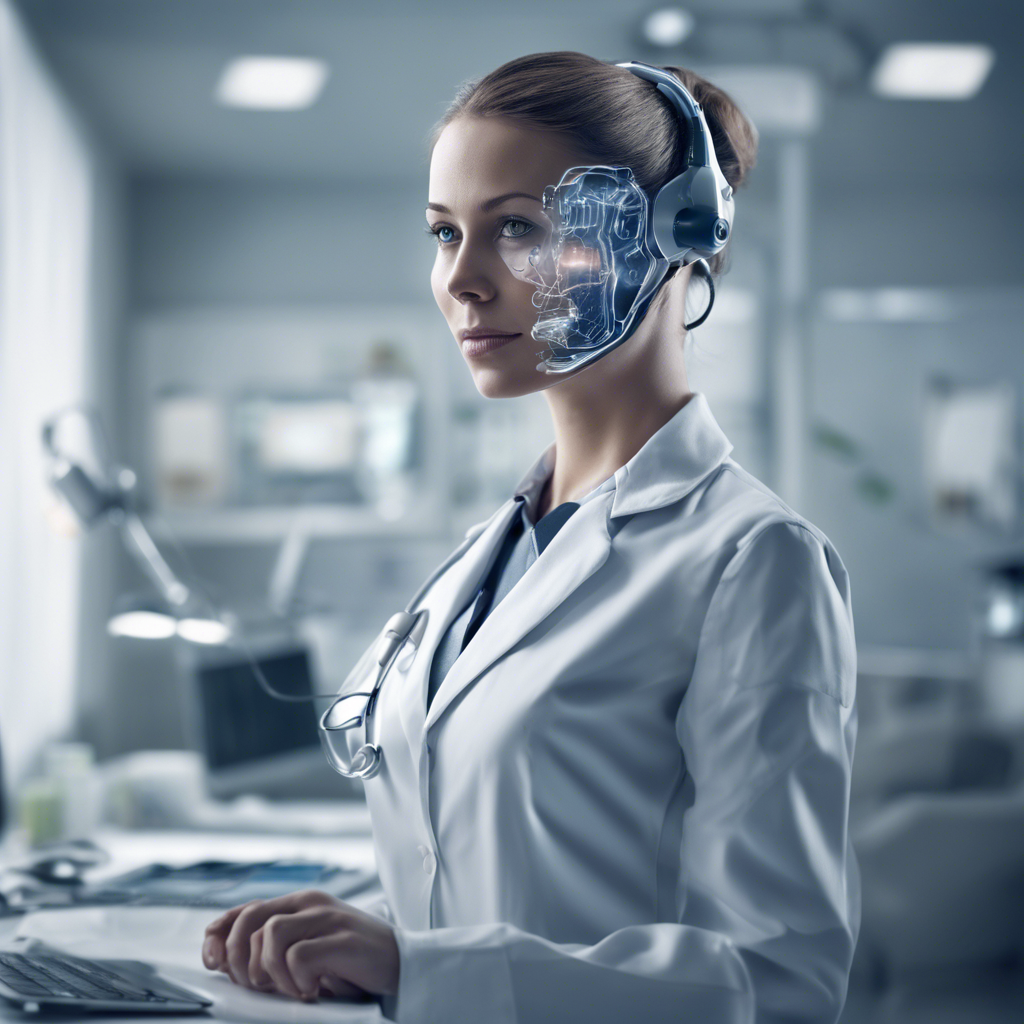
In our rapidly evolving world, the marriage of artificial intelligence (AI) and healthcare is revolutionizing the landscape of medicine in unprecedented ways. The integration of AI technologies in healthcare is not only streamlining administrative tasks but also significantly enhancing patient care and outcomes. AI algorithms are being utilized to analyze vast amounts of medical data with unparalleled speed and accuracy, helping healthcare providers in making more informed decisions and providing personalized treatment plans.
One of the most remarkable impacts of AI in healthcare is its role in early disease detection. AI-powered systems can sift through complex medical images, such as MRIs and CT scans, to identify subtle abnormalities that may go unnoticed by human eyes. This capability is leading to earlier diagnosis of conditions like cancer, cardiovascular diseases, and neurological disorders, ultimately improving patient prognosis and survival rates.
Moreover, AI is playing a pivotal role in predictive analytics, where it can forecast potential health issues based on individual patient data. By analyzing patterns and trends, AI can help healthcare professionals identify high-risk patients and intervene proactively to prevent the onset of diseases or complications. This proactive approach not only saves lives but also reduces healthcare costs by minimizing the need for expensive treatments or hospitalizations.
As we delve deeper into the realm of AI in healthcare, we witness how this cutting-edge technology is reshaping traditional healthcare practices. From virtual health assistants that provide round-the-clock support to patients to AI-driven robotic surgeries that enhance precision and reduce recovery times, the possibilities are endless. The synergy between AI and healthcare holds immense promise for the future, promising a new era of more efficient, accurate, and patient-centered healthcare delivery.
1. Improved Disease Diagnosis
Artificial Intelligence (AI) algorithms have revolutionized the field of healthcare by demonstrating remarkable potential in the timely detection and precise diagnosis of a wide range of diseases. Leveraging advanced computational capabilities, AI systems meticulously analyze extensive sets of patient data to uncover intricate patterns and subtle irregularities that could easily elude human observation. This ability to detect diseases at their nascent stages not only enhances the prognosis and overall outcomes for patients but also equips healthcare professionals with the necessary insights to deliver personalized and effective treatments promptly.
Moreover, AI-driven diagnostic tools have significantly streamlined the healthcare process by expediting the identification of diseases, thereby reducing the time taken for diagnosis and treatment initiation. This acceleration in the diagnostic timeline can be critical in cases where early intervention is paramount for successful therapeutic outcomes. Additionally, the integration of AI technologies in healthcare settings has led to a more efficient allocation of resources, as healthcare providers can prioritize and allocate treatments based on the insights provided by AI algorithms.
Furthermore, the continuous learning capabilities of AI algorithms enable them to refine their diagnostic accuracy over time, making them increasingly adept at identifying complex and rare conditions. This iterative learning process not only enhances the reliability of AI-based diagnoses but also contributes to the ongoing advancement of medical knowledge and expertise.
2. Personalized Treatment Plans
AI has revolutionized the healthcare industry by offering a groundbreaking solution to the challenge of providing personalized treatment plans for patients. The use of AI in healthcare enables healthcare providers to delve deep into the vast amount of data available, including genetic information, medical records, and lifestyle choices, to develop treatment strategies that are uniquely tailored to each patient's specific needs. This level of personalization ensures that patients receive treatments that are not only effective but also take into account their individual characteristics and circumstances, thereby optimizing the chances of successful outcomes.
Moreover, AI-powered analytics can continuously analyze and adapt treatment plans in real-time based on the patient's response to therapy, ensuring that interventions are always optimized for the best possible results. This dynamic approach to healthcare management allows for a more proactive and responsive method of care delivery, enhancing patient outcomes and overall satisfaction.
Furthermore, the integration of AI in healthcare not only enhances treatment efficacy but also contributes to the overall improvement of healthcare systems. By streamlining processes, reducing errors, and increasing efficiency, AI helps healthcare professionals focus more on patient care and less on administrative tasks, ultimately leading to a more patient-centered and efficient healthcare delivery system.
3. Enhanced Administrative Efficiency
AI-powered tools have revolutionized the way administrative tasks are managed within healthcare facilities, marking a significant shift towards increased efficiency and productivity. These innovative technologies are designed to automate various processes, such as appointment scheduling, medical record management, and billing, allowing healthcare providers to dedicate more time and attention to delivering high-quality patient care. By leveraging the power of artificial intelligence, healthcare facilities can streamline their operations, minimize errors, and enhance overall service delivery.
One of the key benefits of AI in healthcare administration is the reduction of manual paperwork and repetitive tasks. By automating routine processes, AI systems enable healthcare professionals to focus on more complex and critical aspects of their work, leading to improved patient outcomes and satisfaction. Moreover, AI-powered tools can analyze vast amounts of data quickly and accurately, providing valuable insights that can inform decision-making and improve the quality of care provided to patients.
In addition to enhancing operational efficiency, AI tools are also instrumental in improving cost-effectiveness within healthcare facilities. By optimizing workflows and reducing administrative overhead, AI can help organizations save time and resources, ultimately leading to better financial performance and sustainability. Furthermore, the use of AI in healthcare administration can contribute to a more seamless and integrated healthcare ecosystem, where information is shared efficiently, leading to better coordination of care and improved patient experiences.
4. Remote Patient Monitoring
With the rise of telemedicine, AI plays a crucial role in remote patient monitoring. Wearable devices equipped with AI algorithms can track vital signs, detect anomalies, and alert healthcare providers in real-time. This continuous monitoring not only enhances patient care but also enables early intervention in case of emergencies.

5. Drug Discovery and Development
AI is transforming the process of drug discovery by accelerating research and development cycles. Machine learning algorithms can analyze vast datasets to identify potential drug candidates, predict their efficacy, and optimize dosages. This innovative approach holds the promise of faster and more cost-effective drug development.
6. Predictive Analytics
By harnessing the power of AI-driven predictive analytics, healthcare providers can forecast patient outcomes, identify high-risk individuals, and allocate resources efficiently. This proactive approach to healthcare management enables preventive measures and contributes to better population health outcomes.
7. Medical Imaging and Diagnostics
AI algorithms are reshaping medical imaging and diagnostics by enhancing the accuracy and speed of image analysis. From identifying tumors in radiology scans to detecting eye diseases in ophthalmology images, AI systems are improving diagnostic capabilities and aiding healthcare professionals in making informed decisions.

8. Virtual Health Assistants
AI-powered virtual health assistants are revolutionizing patient engagement and care management. These intelligent assistants can provide personalized health recommendations, answer medical queries, and offer support to patients round the clock. By empowering patients to take control of their health, virtual assistants are driving better health outcomes.
9. Ethical Considerations
While the benefits of AI in healthcare are undeniable, ethical considerations must guide its implementation. Issues such as data privacy, algorithm bias, and patient consent require careful attention to ensure that AI technologies uphold patient trust and confidentiality. Striking a balance between innovation and ethics is key to realizing the full potential of AI in healthcare.

Conclusion
In conclusion, the integration of artificial intelligence into healthcare holds immense promise for improving patient outcomes, increasing operational efficiency, and driving innovation in the medical field. As AI continues to advance, its transformative impact on healthcare will revolutionize the way we deliver and receive medical care. Embracing this technology with a focus on patient-centric care and ethical standards will pave the way for a brighter and healthier future in healthcare.
As we stride towards a future where technology and healthcare converge, the possibilities are limitless, and the benefits are profound.
By adopting a professional tone, this listicle highlights the key advantages of artificial intelligence in healthcare, catering to a general audience interested in the advancements of technology in the medical field.
Bình luận